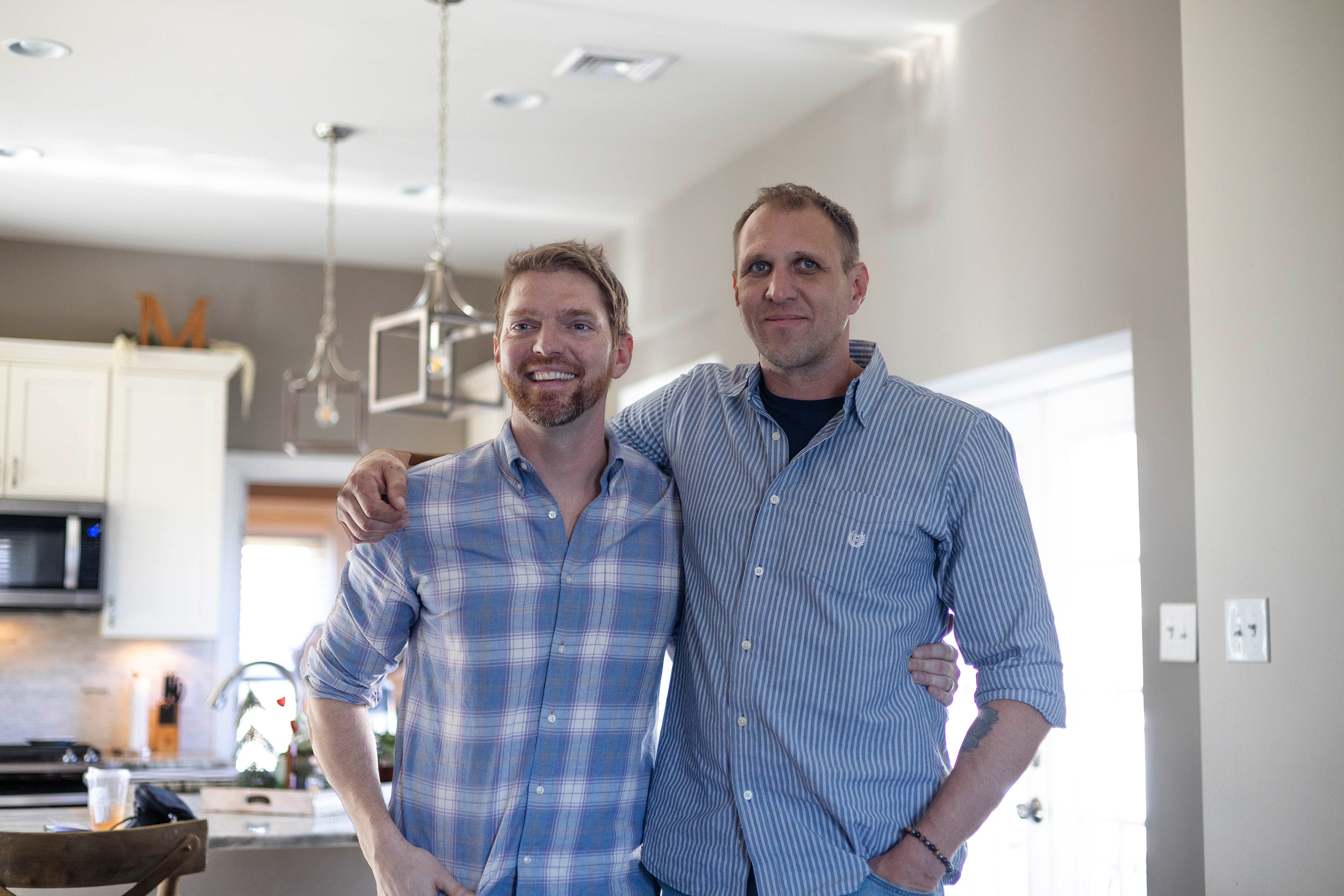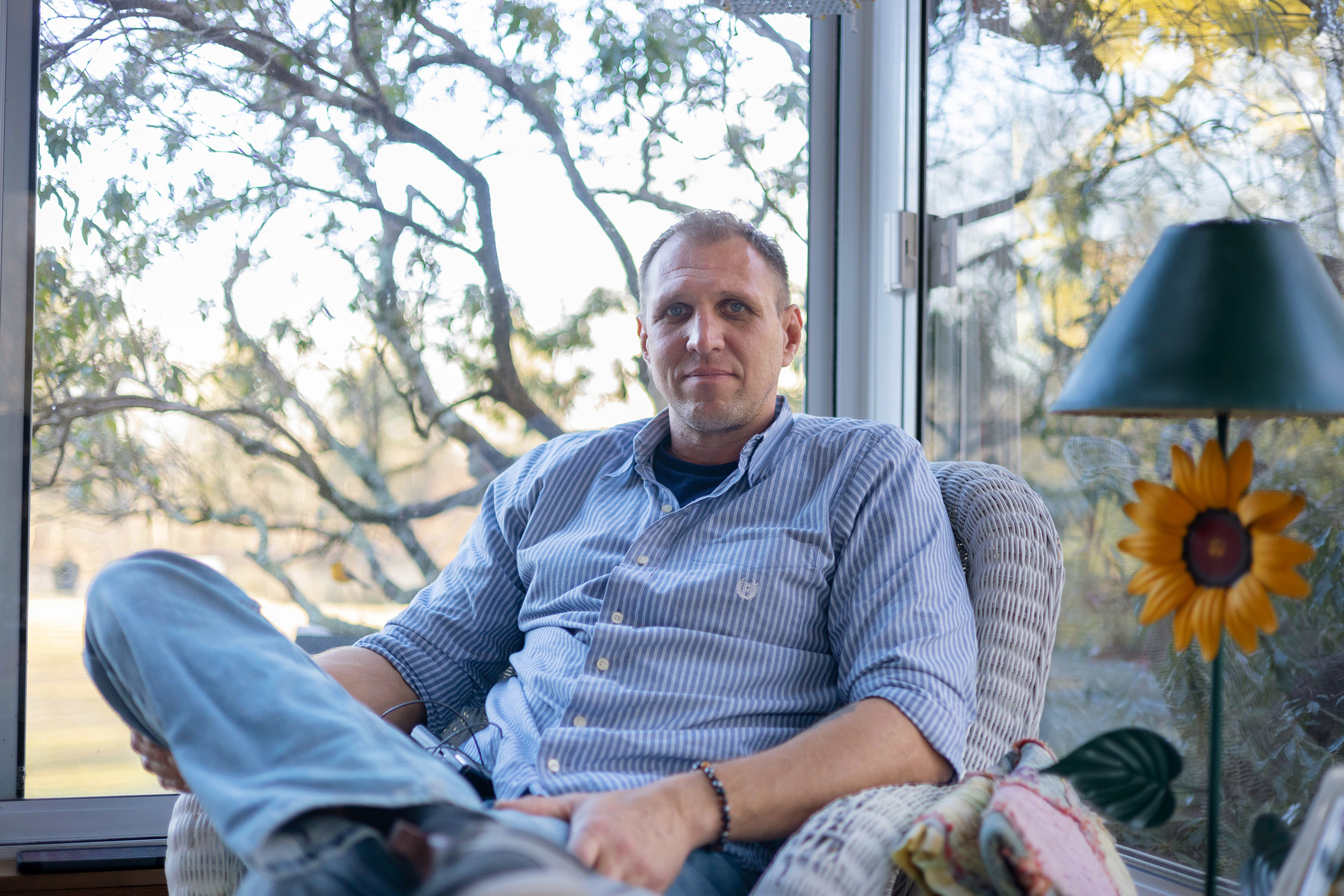Prison journalism helps writer see a better path
QUAKERTOWN, Pa. – For the first time in almost eight years, Ryan Moser is back home in what he calls “the shack,” a well-appointed country home sitting on four acres of land in the woods of Bucks County. It belongs to his family.
It’s here that he can wake up in the morning these days and relish in the simplicity of strolling across the ample lawn.

Moser on the dock of the pond in the backyard of his parent’s home where he comes to reflect and find peace. ~ photo by Jillian Wesner
His present situation is a stark contrast to the previous chapter of his life.
On New Year’s Day, the 45-year-old Moser was released from Florida’s Department of Corrections after serving about eight years of a 15-year sentence for theft, burglary and other crimes related to his addiction to painkillers.
When he began serving that sentence, Moser was in a darker place and his family was about ready to give up on him. He needed another lifeline to survive. The chance to write, and more specifically the opportunity to learn the craft of journalism, was what provided it.
“As far back as I can remember, I’ve been writing,” he said in a recent interview. “I used that for my youth as a place of happiness through sadness, through the darkness. That’s why it means so much to me today.”
The path to prison
Moser’s life wasn’t supposed to unfold this way, of course. His childhood memories are fond, as he grew up spending most of his time having fun with his family and loved ones.

Miles Moser, left, and Ryan Moser have made efforts to reconnect since Ryan’s release from prison on Jan. 1, 2023. The two spend time at Miles’ home in Doylestown, Pennsylvania. ~ photo by Jillian Wesner
Despite that support, though, Moser found himself running into trouble early on and developing addiction issues.
The first two times that he was convicted, he was not sentenced to prison but to a work camp, where he spent his time with an outside squad, returning to a minimal security institution at the end of each day.
Serving the time wasn’t enough to break his habits. Moser needed help, help he wasn’t receiving. This lack of rehabilitation ultimately brought him back into the criminal justice system – and, this time, to prison.
“I was scared, I’m not going to lie to you. I was worried that I might not make it through it. I wrote an essay about this, where I addressed it,” Moser said. “I felt like one of my biggest fears in prison was that I would have to become an animal to survive.”
His family had been a huge form of support through the tribulations he had previously faced, but the severity of this sentence – up to 15 years – is where they drew the line.
In his personal essay, “The Renaissance of Inmate B-” he discusses a conversation he had with his mother, Sue.
“You just keep getting in trouble, Ryan, with no regard for us or your sons,” said Sue. “I just hope that this is the last time you get locked up because I don’t know if we’ll be here for you again.”
Their words came from a place of hurt, as Moser’s relatives were trying to guard themselves but also feel the pain of his absence.
Moser’s younger brother, Miles, remembers hearing the news of this extended sentence.
“I think the worst part was thinking about (Ryan) having to live in there for so long,” he said. Especially when it’s like, ‘Oh, Ryan got in trouble again, I hope it’s not another year (in prison).’ But 15, what?”
Moser was never a violent person, but he faced the reality of prison ready to fight for his life, like an animal backed into a corner. At every turn as an inmate, he met aggression with aggression, and it morphed him into a person he failed to recognize.
“I just hope that this is the last time you get locked up because I don’t know if we’ll be here for you again.” Sue Moser
But surviving wasn’t enough. He was going to have to prove to himself that he could be stronger than what brought him here in the first place, and better than what the reality of incarceration had changed him into.
Thriving through writing
Moser searched for ways to get involved inside that would help him move forward but was met with mockery. Prison officials looked at him only as a reoffender, with no potential to change his habits. The words damaged his pride but became fuel to the fire burning brightly inside of him.
He had always been an artist, mostly using it to get his thoughts out on paper. He continued these habits through his days inside.
Until prison, he never considered the thought of being a journalist. When he heard about a program where he could better his writing skills, he jumped at the chance.
After becoming what is known as a model prisoner, following the rules and avoiding trouble, he was offered a spot in the pilot program at Everglades Correctional Institution, where he began to take his writing seriously.
Through this opportunity, Moser was taking creative nonfiction, poetry and essay classes.
“People don’t know about incentivized prisons,” Moser said. “There’s this prison where people actually get up and go to classes all day long and use computers and go to poetry class and volunteer community service to clean up the yard.”
His work was then reviewed and released online where it caught the attention of publications. Pieces were published by The Marshall Project and Poynter Institute, opportunities almost unheard of for people in his situation. Moser described getting published as a slightly strange experience because, unlike journalists on the outside, he could not see the publication immediately.
It was during his five-year tenure with the program that he was contracted by Prison Journalism Project, known as PJP, as well as Exchange for Change.
Editors saw his work online and wanted to collaborate with him to ensure he received the best training to write journalistically.
PJP worked with Moser through its journalism school, which directly interacts with incarcerated writers and gives them the skills they need to write in the field.
“While Ryan started in creative writing – and has a natural gift at it – he studied and trained himself to practice journalism as well,” said Emily Nonko, the director of writing for liberation for Empowerment Avenue. “I cannot stress how determined Ryan was to improve his writing, and it was an honor to see him take on new subjects and put out consistently interesting work.”
Empowerment Avenue asked him to collaborate with a magazine, The Wild Word, where he wrote monthly personal essays. He titled his collection, “From the Inside.”
Rebuilding
Birthdays, weddings, holidays. They were all spent alone with pen and paper. Moser felt the loss of each passing occasion, but one stood apart from the others.
“That month’s essay, it was about losing a loved one inside and you can’t get into the funeral. You can’t,” Moser said. “I had to say goodbye to my father over the phone while he was laying on his hospital bed.”
The death of his father two years ago was a pivotal point in his life and continued to fuel the passion to become a better writer.
“Losing him, being so close to going home, was difficult because I can feel the absence in my life,” Moser said. “Especially my creative life.”
Ryan’s father, Randy Moser, was his biggest support when it came to writing. It continued through his incarceration until Randy’s death.
“You have people that encourage you no matter what, and that was my father,” Moser recalled. “Because he was there from the beginning, when nobody really thought I could start writing.”
The loss of their patriarch resulted in bringing the Moser family closer than where it stood in the years before. Moser recalls at some points describing their relationship as estranged.
Miles stepped in and became the support system Ryan needed as he finished out the remainder of his sentence.
“I transferred the baton. I took the torch of receiving all of his original writings,” Miles said.
Until then, Randy had been receiving all of Moser’s original work, a step which was needed for documentation related to intellectual property protections.
Miles inherited nearly every piece of writing Ryan created while in prison, which is easily thousands of projects on topics ranging making prisons greener to depictions of daily prison life. He kept them all safe in plastic boxes in the basement of his home where they still remain today.
For Ryan Moser, one relationship has suffered more than the rest, and that has been with a young adult son. Being only a child when his father went away to prison has made it so the two know little about one another.
For the month-plus that Moser has been home, he has been working to foster that relationship, whatever form it may ultimately take.
“The most important thing is, I can never let him down again,” Moser said. “You cannot rebuild relationships with people and then let them down over and over and expect them to be there for you.”

Ryan Moser has lived in a home owned by his parents in Quakertown since his release from prison on Jan. 1, 2023. ~ photo by Jillian Wesner
Brighter Future
Almost immediately after he got out, Moser was quick to get started on his professional career he had worked so long to develop. With conferences and speeches planned in various states across the country, he had much to look forward to.
To ensure his ability to get back on his feet, Empowerment Avenue bought him a car with the money he had saved through his writing during his incarceration.

Ryan Moser, 45, drives a car bought for him by Empowerment Avenue using the money he earned during his incarceration. ~ photo by Matthew Gelhard
They worked hard to make certain that Moser was paid an equal amount to what publications profited from publishing his work. While churning out handfuls of published stories, he earned close to $11,000 in a year alone.
Ryan’s return to “the shack” was long awaited and thoroughly celebrated within his family. He uses much of his time to reconnect and build trust with them.
Their home has become a safe space for him to continue to grow his writing career inside an office overlooking the pond sprawling over most of the backyard. It is a place where he can reflect and relax.
For the first time, he was able to meet Miles’ children and wife, Jessica. Ryan and his brother now make an effort to see each other almost daily, after having their plans interrupted all those years ago.
“Instead of just talking about future planning, it’s like, ‘What are we doing tomorrow?’” Moser said. “Instead of ‘What are we doing in three years?’”
~ 02.20.2023
Jillian Wesner captured in both images and words an incredibly poignant story about a man embarking on a journey to redemption through his writing. Brava on telling Ryan’s story in such a compelling and compassionate way.